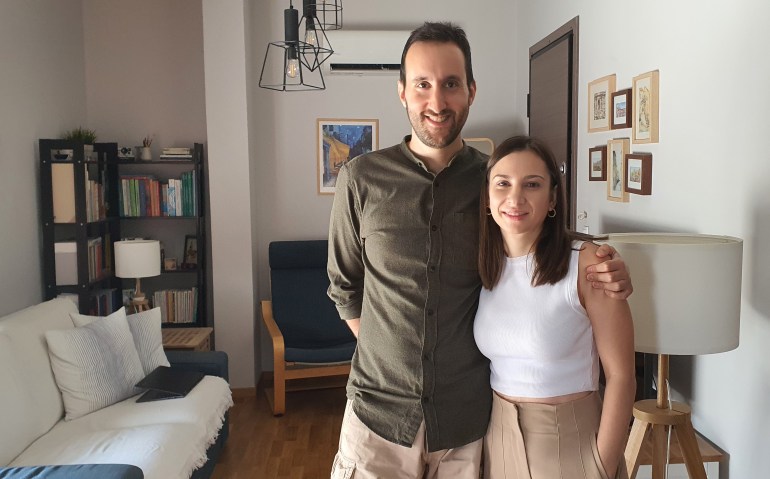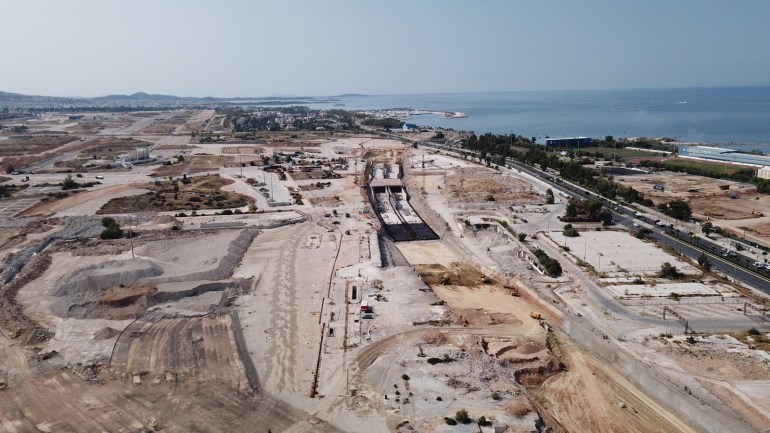Tourism’s dark side: Are those who love Greece killing it?
Athens, Greece – Shortly after the conservative New Democracy party came to power in Greece in 2019, computer scientist Nikos Larisis left his job in the Netherlands and repatriated to the Mediterranean country for a salary worth a third of the 9,000 euros ($9,500) he was making per month.
He appeared to vindicate New Democracy’s pledge to bring back about half a million educated young workers who had fled the country’s economic depression from 2010 to 2018.
The conservatives returned to power for a second term in June with little evidence that many Greeks had followed in Larisis’s footsteps.
Even he and his fiancee, Eleftheria Tsiartsiani, a public elementary schoolteacher, had been feeling stuck and were considering going abroad.
They were paying a quarter of their joint income in rent and could not borrow enough money to buy the two-bedroom home in which they dreamed of starting their family.
Then the government announced a 1.8-billion-euro ($1.9bn) programme to help young couples buy their first home.
“Eleftheria told me, ‘Niko, we can buy a home. We can reconsider. We needn’t pick up stakes and leave,’” Larisis told Al Jazeera.
But after looking into the government’s offer, called My Home, the couple became disillusioned.
“It wasn’t designed well at all. It led people on and destroyed their dreams,” Larisis said.

Larisis and Tsiartsiani could borrow 90,000 euros ($96,000) under the programme, but that did not secure an attractive family home in a market geared towards foreign buyers spending 250,000 euros ($270,000) for a Golden Visa, which at the time offered them five years of legal residence and a path to citizenship. The spending requirement for the Golden Visa has since changed to double that amount.
“I’m going to let the state keep its 90,000 euros,” Tsiartsiani said. “There’s no point in buying a small, old apartment, dark and dank, that doesn’t fit our needs, smelling of mould in an unkempt building and being in debt up to my neck for the rest of my life.”
Moreover, Tsiartsiani said: “We saw a lot of sales ads that stipulated, ‘The property isn’t for sale through the My Home programme.’”
Sellers told the couple they did not believe they would get their money from the government and wanted cash only.
The experience convinced the couple that Greek law was tilted in favour of non-Greeks.
My Home did not allow beneficiaries to rent out their property and restricted them to buying a property close to work. The Golden Visa programme has no such limitations.
“There’s a big party going on. Foreign capital is trying to take advantage of the situation here, and the laws are helping them. Golden Visas allow people to come and buy homes here … while others are struggling with loans they can’t repay,” Larisis said.
The sting in tourism’s tail
Greece’s big economic success under New Democracy has been tourism, which has boomed since the COVID-19 pandemic, attracting three times Greece’s population each year. It brought in a near-record 18 billion euros ($19bn) in revenue last year.
Tourism helps bring in the foreign currency with which Greece services its loans, and it has helped existing homeowners. About 105,000 properties are now offered on short-term rentals through Airbnb.
But it has also worsened a demographic problem. By restoring real estate value lost during the depression, it has put first homes out of the reach of young people.
“We emerged from the pandemic with a bit of extra cash, … which was mainly concentrated on housing,” said real estate consultant Stelios Bouras, who runs the Greek Guru real estate news website. “Working at home, people wanted larger houses. … This coincided also with a massive increase in Greek homes going to foreign buyers.”
Average Greek property prices increased by 12 percent last year, and are set to increase by another 14 percent this year, according to Bank of Greece data.
That has spurred investment in real estate, but almost all of it is geared towards the top end of the market.

The Ellinikon is a prime example – a 600-hectare (1,500-acre) urban redevelopment of what used to be the Athens airport, nestled among the city’s southern suburbs.
Its first project, Marina Tower, now rising along the Attica shore, will be Greece’s tallest building when it is finished.
It will also be one of the most expensive. Every floor has been sold at a reputed 16,000 euros ($17,000) per square metre (nearly 11sq ft).
The Ellinikon’s owners said real estate will average 10,000 euros ($10,600) per square metre, but that is still well above the capabilities of most Greeks.
“The growth in the market which everyone is citing right now in terms of investment is for your high net worth individual from abroad and your top income level in Greece,” Bouras told Al Jazeera.
“For the vast majority, there is zero development. And if you look at government policy to increase supply levels, there is almost no movement,” he added.
The Ellinikon’s CEO makes no apology for the fact that 30 percent of the 1.2 billion euros ($1.27bn) of real estate he has already sold has gone to Syrians, Egyptians, Emiratis, other Europeans and Americans.
Odysseas Athanasiou argued that by attracting foreign buyers, The Ellinikon opens up Greece’s stagnant economy.
“For many, many decades, Greece was redistributing the pie of wealth, or poverty, if you will, and now with the new income that is coming from all places in the world, we are bringing in new money. The new money will be distributed more or less to everybody,” Athanasiou told Al Jazeera.
Among other benefits, Athanasiou says, The Ellinikon will create 80,000 permanent jobs.
Shrinking, ageing population
Greek society faces a potentially existential problem, and property prices are making it worse.
Its population has been shrinking since the turn of the century. That shrinkage accelerated after its eurozone partners imposed austerity policies on it in return for emergency loans in 2010.
Greece’s birth rate fell by 30 percent from 2011 to 2021 to under 84,000 per year, slipping ever-further below the death rate, according to the Hellenic Statistical Service.
The cumulative population loss during that decade was 329,451, which roughly tallies with the 2021 census recording a 3.1 percent population drop.
Given that each Greek paid on average 5,758 euros ($6,125) in taxes and social security contributions last year, this drop represents a loss of nearly 2 billion euros ($2.13bn) a year in state revenue – about 3.2 percent – over the long term.
Analysts said that by mid-century, Greece could find it difficult to generate the current level of state revenue – 60 billion euros last year ($64bn) – or man its armed forces.
The population drop is especially damaging in combination with ageing. Only 4.2 million Greeks work, supporting a total population of 10.5 million, including three million pensioners.
New Democracy has begun Greece’s first capitalised social security scheme for the under 25s, but for now, the majority of pensioners relies on current contributions.
New Democracy has also launched a series of measures to tackle the population decline and may have had a measure of success.
It delivered on promises to reduce the income tax, sales tax and social security contributions and offered paternity leave and extended daycare.
It offered a 2,000-euro ($2,200) cash handout per child, raised the tax rebate for families by 1,000 euros ($1,065) and now promises to drive up average salaries from 1,170 to 1,500 euros ($1,245 to $1,600).
Signs of improvement
Greece may have begun to see a faint heartbeat of improvement. Live births increased by 1.2 percent in 2020 and by 0.7 percent in 2021.
But My Home, its biggest direct measure to help young couples move ahead with their lives, has met with mixed results.
The programme was meant to accommodate 137,000 young people, but only 4,500 applications have received state approval and not all of them have gone on to receive bank approval.
“All programmes undergo evaluation and correction,” Maria Syrregela, deputy labour minister under the previous government told Al Jazeera. “My Home was the start of an ongoing state programme to provide housing.”
Syrregela was in charge of demographic policy, and perhaps her biggest achievement was that she got the opposition to sign onto a multiyear plan of action.
“Demographic policy isn’t about doing something today and having tangible results tomorrow,” she said.
“If you start a programme now, you might see results in 10 years. That’s why governments tended not to bother.”



